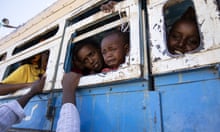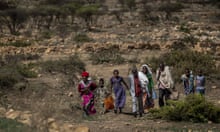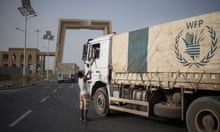The interim government of Ethiopia’s war-hit Tigray region has fled as rebel fighters advanced into the region’s capital and the national government announced a “unilateral ceasefire”.
Witnesses said federal soldiers and police were also abandoning Mekelle late on Monday, and fireworks and celebratory gunfire could be heard as Tigrayan fighters took the city’s airport and other key positions.
“The capital of Tigray, Mekelle, is under our control,” Getachew Reda, the spokesperson for the Tigray People’s Liberation Front (TPLF), told Reuters by satellite phone late on Monday.
One local official told Agence France-Presse that the interim local government had opted to leave their posts in Mekelle as rebel fighters closed in “on every side”.
“Everybody has left. The last ones left in the afternoon. The region doesn’t have a government,” said the official. “It looks like from the way the community is reacting that … perhaps the troops have retreated from here.”
Shortly after news broke of the rebels’ advance, Ethiopia’s government declared an immediate unilateral ceasefire in the region.
The ceasefire “will enable farmers to till their land, aid groups to operate without any military movement around and engage with remnants (of Tigray’s former ruling party) who seek peace”, Ethiopia’s statement said, adding that efforts to bring Tigray’s former leaders to justice continued.
Ethiopia said the ceasefire would last until the end of the crucial planting season in Tigray. The season ends in September. The government ordered all federal and regional authorities to respect the ceasefire.
The UN secretary-general, Antonio Guterres, said in a statement that he had spoken with Abiy, adding: “I am hopeful that an effective cessation of hostilities will take place.”
Humanitarian staff in Mekelle confirmed the departure of interim administration officials. “The interim officials left this morning,” said the humanitarian official in the city.
The British embassy in Ethiopia said the ceasefire was an “important development” in the nearly eight-month conflict, and called on all parties to respect it.
Federal troops invaded Tigray in November, sparking global outrage and condemnation of Nobel peace prize winner and prime minister, Abiy Ahmed. The government said it had acted after rebel attacks on military bases, and the TPLF, which formerly ruled Ethiopia for nearly three decades, was ousted within six weeks.
Close to a million civilians have been internally displaced and have fled into neighbouring Sudan, amid fears of a spiralling ethnic conflict and widespread reports of atrocities that could amount to war crimes.
The rebel fighters, known as Tigrayan Defence Forces (TDF), appeared to have been subdued, but in recent weeks they launched a series of counteroffensives, and a surge in fighting coincided with Ethiopia’s national elections earlier this month.
Residents had reported rebels advancing as close as 55 kilometres of the city, with the rebels boasting of inflicting major losses on federal forces. The polls were not held in Tigray.
Last week, residents reported that flights to Mekelle were restricted, and as fighting intensified, officials were said to be denying permits for aid operations in towns outside of the city.
The ongoing conflict, a grinding guerrilla war, has triggered a rapidly worsening humanitarian crisis, with 350,000 people on the brink of famine according to the UN, and 140,000 children “facing famine-like conditions”.
Last week at least 64 people were killed and 180 injured in a government airstrike on a market in the city of Togoga, according to local health officers, doctors, local residents and witnesses.
Ethiopia said the airstrike targeted rebel fighters, but survivors and health workers said the attack was on a busy market and killed and injured dozens, including children.
Aid agencies have been heavily restricted by Ethiopia’s government from providing desperately needed aid, while Abiy has denied that any hunger exists in Tigray.
As government soldiers withdrew from Mekelle on Monday, Unicef accused the military of destroying its satellite equipment. “Members of the Ethiopian National Defence Forces entered our office in Mekelle, Tigray Ethiopia today and dismantled our VSAT equipment.” It added: “We are not and should never be a target.”














